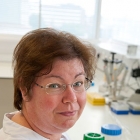Molecular Haemostasis Laboratory at St Thomas' Hospital
Laboratory overview
Our laboratory provides molecular analysis of genes associated with heritable bleeding and clotting disorders.
Identification of the pathogenic causative genetic variant is an essential tool in management of patients with a haemostatic disorder for a number of reasons:
- It permits definitive diagnosis of a disorder in those cases where phenotypic results are either unavailable or equivocal,
- It enables identification of carriers of a disorder who although unaffected themselves are at risk of transmitting the disorder to their children,
- It enables prenatal diagnosis of a foetus in utero, to inform decisions about delivery management,
- It can assist in the prediction of clinical course and therefore inform clinical decision making.
Our customers are Mainly Haemophilia Centres across the South and South East of the UK, for whom we support all their molecular haemostasis needs.
Other haemophilia Centres throughout the UK, and across the globe refer samples to us for analysis not available locally.
Key features:
- We offer specialist clinical and laboratory services.
- We are a centre of excellence.
- Our staff are leaders in their field.
Last updated on 15/01/2014
Monday, 18 July, 2016
Dr Agata Sobczyńska-Malefora
,
Jacky Cutler
,
Rahman Y
Thursday, 4 September, 2014
Alesia Hunt
,
Dr Dominic Harrington
,
Susan Robinson
Chief Scientific Officer

Consultant Clinical Scientist / Honorary Senior Lecturer at King's College London
Operations Manager

Reference Services Quality Manager
Molecular Haemostasis Laboratory at St Thomas'
020 7188 2798
Haemostasis and Thrombosis
North Wing - 4th floor
St Thomas' Hospital
Westminster Bridge Road
London SE1 7EH
Laboratory opening times
Monday - Friday 09.00 - 17.00
North Wing - 4th floor
St Thomas' Hospital
Westminster Bridge Road
London SE1 7EH
Laboratory opening times
Monday - Friday 09.00 - 17.00
Last updated: 15/01/2014

